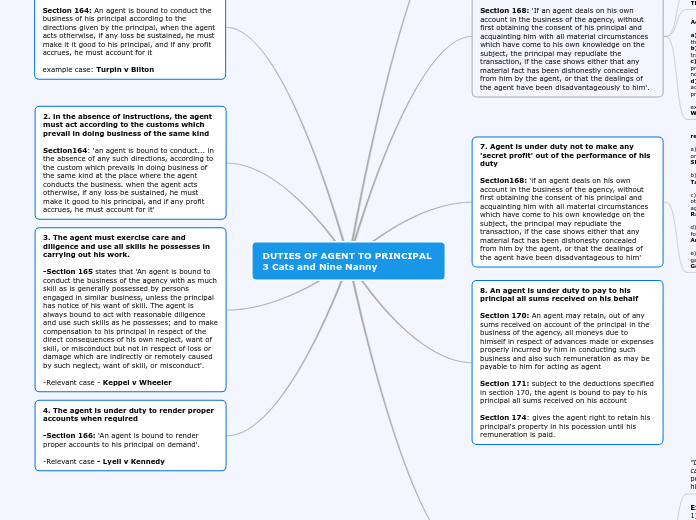DUTIES OF AGENT TO PRINCIPAL
3 Cats and Nine Nanny
5. Agent must communicate with the principal during emergency or difficulty
-Section 167 says that 'It is the duty of an agent, in cases of difficulty, to use all reasonable diligence in communicating with his principal, and in seeking to obtain his instruction'.
-refer to section 142
6. Agent must act in good faith and no conflict of interest.
Section 168: 'If an agent deals on his own account in the business of the agency, without first obtaining the consent of his principal and acquainting him with all material circumstances which have come to his own knowledge on the subject, the principal may repudiate the transaction, if the case shows either that any material fact has been dishonestly concealed from him by the agent, or that the dealings of the agent have been disadvantageously to him'.
Section 169: 'If an agent, without knowledge of his principal, deals in the business of the agency on his own account instead of on account of his principal, the principal is entitled to claim from the agent any benefit which may have resulted to him from the transaction'.
The illustration to s 169 says
Acting in good faith and no conflict of interest means:
a) The agent cannot become a party to the transaction with the principal.
b) The agent cannot act on behalf of both parties to a transaction at one time without their consent.
c) The agent must disclose everything that he knows, to the principal relating to all material facts of the contract. He is also not allowed to disclose his principal's secret to the other.
d) All monies and profits should be put into the principal's account. The agent cannot mix them with his own money or property
example cases: Armstrong v Jackson, Wong Mun Wai v Wong Tham Fatt, Fullwood v Hurley.
7. Agent is under duty not to make any 'secret profit' out of the performance of his duty
Section168: 'if an agent deals on his own account in the business of the agency, without first obtaining the consent of his principal and acquainting him with all material circumstances which have come to his own knowledge on the subject, the principal may repudiate the transaction, if the case shows either that any material fact has been dishonesty concealed from him by the agent, or that the dealings of the agent have been disadvantageous to him'
remedies available principal
a) the principal may repudiate the contract which was made on his behalf by the agent with a 3rd party. refer to section169 Shipway v Broadwood
b) the principal may recover the amount of the secret profit.
Tan Kiong Hwa v Andrew S.H. CHong
c)the principal may refuse to pay the agent's commission or other remuneration. If the commission has been paid to the agent the principal is entitled to claim it back. Andrews v Ramsay & Co
d)the principal may dismiss or terminate the agent's authority for breach of duty. Boston Deep Sea Fishing & Ice Co v Ansel
e) the principal may sue both the agent and the 3rd party who gave the bribe for the losses suffered. Mahesan v Malaysian Government Officers Co-Operative Housing Society
8. An agent is under duty to pay to his principal all sums received on his behalf
Section 170: An agent may retain, out of any sums received on account of the principal in the business of the agency, all moneys due to himself in respect of advances made or expenses properly incurred by him in conducting such business and also such remuneration as may be payable to him for acting as agent
Section 171: subject to the deductions specified in section 170, the agent is bound to pay to his principal all sums received on his account
Section 174: gives the agent right to retain his principal's property in his pocession until his remuneration is paid.
9. An agent cannot delegate his authority to another person.
"Delegatus non potest delegare" means 'a delegate cannot delegate'. An agent cannot employ another person to do his duty. He must perform the duty by himself.
Exceptions: 1) Where the delegation of the authority is approved by the principal. 2) Where it is presumed from the conduct of the parties that the agent would have power to delegate his authority to other person to perform his duty. Relevant case: De Bussche v Alt 3) Where the custom or norm of the business allows delegation. e.g. to employ clerk or assistant. 4) In case of necessity or unforeseen emergency. E.g. illness of agent or where he was injured in an accident. 5) If the act to be is purely ministerial or clerical which does not involve any discretion or professional skill of the agent. Relevant case: Allam & Co Europa Poster Services Ltd and John Mccann & Co v POW 6) Where the nature of the agency is such that delegation of authority to another person is necessary to complete the business.
